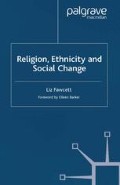Abstract
Looking back on my time in South Africa, one of the most vivid pictures that comes to mind is of one of the many visits I paid to farms owned by Afrikaners in the area round Louis Trichardt. This particular farm was a bustling hive of activity with several black farm labourers working intently on a welter of different tasks. The lush, abundant garden round the farmhouse indicated that this 60-acre farm enjoyed plentiful supplies of piped water. However, just beneath it, obscured by trees, was a stark reminder of the social hierarchy left by apartheid. For, if one peered downwards through the foliage, one saw below a broad, barren-looking expanse of plain, dotted with townships. That land formed part of the black ‘homeland’ of Venda; land onto which blacks were eventually moved after much of their own territory had been taken away from them and given to white settlers.1 The owner of this farm, Pieter De Wet, claimed the Vendas had failed to utilise the potential of the land they had had bestowed on them by whites.2
Access this chapter
Tax calculation will be finalised at checkout
Purchases are for personal use only
Preview
Unable to display preview. Download preview PDF.
Notes and References
Keane, Fergal (1996) Letter to Daniel: Despatches from the Heart (London: BBC Books/Penguin) pp. 103–4.
Todd, Jennifer (1994) ‘History and Structure in Loyalist Ideology: The Possibilities of Ideological Change’, Irish Journal of Sociology, vol. 4, p. 70.
See Edwards, John (1995) Affarmative Action in a Sectarian Society: Fair Employment Policy in Northern Ireland (Aldershot: Avebury).
In his Forward to the FEC’s 1996/97 Annual Report, the Commission’s Chairman, Bob Cooper, says ‘there is no evidence whatsoever to support the contention that progress for Catholics has resulted in Protestants now experiencing disadvantage’ (Fair Employment Commission for Northern Ireland (1997) Eighth Annual Report 1996/7 (Belfast: FEC)).
This statement was used by Dean R. Hoge to measure ‘racial integration’ in a study of attitudes in the United Presbyterian Church in the United States. See Hoge, Dean R. (1976) Division in the Protestant House: The Basic Reasons Behind Intra-Church Conflicts (Philadelphia: Westminster Press), p. 147.
See van Dijk, Teun A. (1997) ‘Political Discourse and Racism: Describing Others in Western Parliaments’ in Riggins, Stephen Harold (ed.) The Language and Politics of Exclusion: Others in Discourse (Thousand Oaks, CA: Sage), pp. 31–64, and
van Dijk, Teun A. (1993) Elite Discourse and Racism (Newbury Park, CA: Sage).
For an analysis of data on identity from the Northern Ireland Social Attitude surveys and a review of similar data from other surveys, see Trew, Karen (1996) ‘National Identity’ in Breen, Richard, Devine, Paula, and Dowds, Lizanne (eds) Social Attitudes in Northern Ireland: The Fifth Report 1995–6 (Belfast: Appletree Press), pp. 140–52. Trew does include an analysis of the data based on location and social class. However, none of these surveys has given respondents the specific option of calling themselves ‘Protestant’.
Author information
Authors and Affiliations
Editor information
Copyright information
© 2000 Liz Fawcett
About this chapter
Cite this chapter
Fawcett, L. (2000). Fear, Insecurity and Alienation. In: Campling, J. (eds) Religion, Ethnicity and Social Change. Palgrave Macmillan, London. https://doi.org/10.1057/9780333983270_4
Download citation
DOI: https://doi.org/10.1057/9780333983270_4
Publisher Name: Palgrave Macmillan, London
Print ISBN: 978-1-349-40457-5
Online ISBN: 978-0-333-98327-0
eBook Packages: Palgrave Social & Cultural Studies CollectionSocial Sciences (R0)

